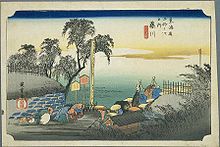Fujikawa-shuku
- Fujikawa-shuku
-
34° 54′ 40″ N 137° 13′ 23″ E / 34.911, 137.223
Fujikawa-shuku (藤川宿, Fujikawa-shuku?) (parfois Fujikawa-juku) était la 37e des 53 stations qui jalonnaient la route du Tōkaidō, l'axe majeur dans le Japon de l'ère Edo. Elle se situait dans la ville actuelle de Okazaki, dans la préfecture d'Aichi, au Japon.
La station est distante de la précédente shukuba (station d'étape), Akasaka-juku, d'environ 9 km[1].
À Okazaki se trouve le Musée des archives de Fujikawa-shuku, où est détaillée l'histoire de la station ; il reste également une honjin (auberge pour les envoyés du gouvernement) encore préservée[2].
Notes et références
Bibliographie
- (en) Patrick Carey, Rediscovering the Old Tokaido:In the Footsteps of Hiroshige, Global Books UK, 2000 (ISBN 1901903109)
- (en) Reiko Chiba, Hiroshige's Tokaido in Prints and Poetry, Tuttle, 1982 (ISBN 0804802467)
- (en) Jilly Traganou, The Tōkaidō road: traveling and representation in Edo and Meiji Japan, Routledge, 2004 (ISBN 9780415310918)
- Gabriele Fahr-Becker, L'Estampe japonaise, Taschen, 2006 (ISBN 978-3-8228-2057-5)
- Gisèle Lambert et Jocelyn Bouquillard, Le Tōkaidō d'Hiroshige, Bibliothèque de l'image, 2002 (ISBN 2-914239-69-6)
Articles connexes
Wikimedia Foundation.
2010.
Contenu soumis à la licence CC-BY-SA. Source : Article Fujikawa-shuku de Wikipédia en français (auteurs)
Regardez d'autres dictionnaires:
Fujikawa-shuku — nihongo|Fujikawa shuku|藤川宿|Fujikawa shuku was the thirty seventh of the fifty three stations of the Tōkaidō. It is located in the present day city of Okazaki, in Aichi Prefecture, Japan. It was approximately 9 km from Akasaka juku, the preceding… … Wikipedia
Fujikawa — bezeichnet: Fuji (Fluss), einen Fluss in der japanischen Präfektur Yamanashi Fujikawa (Shizuoka), eine ehemalige Stadt in der Präfektur Shizuoka (eingemeindet nach Fuji (Shizuoka)) Fujikawa (Yamanashi), eine Stadt in der Präfektur Yamanashi… … Deutsch Wikipedia
Ai no shuku — were unofficial post stations along historical routes in Japan. These post stations formed organically along routes (such as the Tōkaidō and the Nakasendō) when the distance between two places was too far or when there were difficult passes… … Wikipedia
Ai no shuku — Les Ai no Shuku (間の宿, station intermédiare?) étaient des stations informelles le long des routes historiques du Japon. Ces stations se formaient naturellement sur les routes (telles que le Tōkaidō et le Nakasendō) quand la distance entre deux… … Wikipédia en Français
Okazaki-shuku — Okazaki juku in the 1830s, as depicted by Hiroshige in the Hoeido edition of The Fifty three Stations of the Tōkaidō (1831 1834) Okazaki shuku (岡崎宿, Okazaki shuku … Wikipedia
Nissaka-shuku — in the 1830s, as depicted by Hiroshige in The Fifty three Stations of the Tōkaidō Nissaka shuku (日坂宿, Nissaka shuku … Wikipedia
Mishima-shuku — in the 1830s, as depicted by Hiroshige in the Hoeido edition of The Fifty three Stations of the Tōkaidō (1831 1834) Mishima shuku (三島宿, Mishima shuku … Wikipedia
Les Cinquante-trois Stations du Tōkaidō — Portrait de Hiroshige, le crâne rasé, à cinquante ans passés[N 1], par Kunisada. Les Cinquante trois Stations du Tōkaidō ( … Wikipédia en Français
Liste des stations du Tōkaidō — Le Tōkaidō en 1865. Les 53 Stations du Tōkaidō (東海道五十三次, Tōkaidō Gojūsan tsugi?) éta … Wikipédia en Français
53 Stations of the Tōkaidō — tations of the TōkaidōThere were originally 53 government post stations along the Tōkaidō, where travelers had to present traveling permits at each station if wanting to cross. All of the stations, in addition to the starting and ending locations … Wikipedia
 Fujikawa-juku dans les années 1830, représenté par Hiroshige dans les Cinquante-trois Stations du Tōkaidō
Fujikawa-juku dans les années 1830, représenté par Hiroshige dans les Cinquante-trois Stations du Tōkaidō
